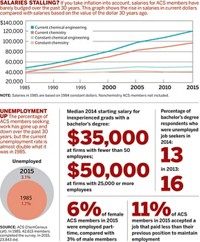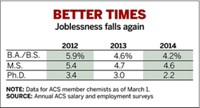Advertisement
Grab your lab coat. Let's get started
Welcome!
Welcome!
Create an account below to get 6 C&EN articles per month, receive newsletters and more - all free.
It seems this is your first time logging in online. Please enter the following information to continue.
As an ACS member you automatically get access to this site. All we need is few more details to create your reading experience.
Not you? Sign in with a different account.
Not you? Sign in with a different account.
ERROR 1
ERROR 1
ERROR 2
ERROR 2
ERROR 2
ERROR 2
ERROR 2
Password and Confirm password must match.
If you have an ACS member number, please enter it here so we can link this account to your membership. (optional)
ERROR 2
ACS values your privacy. By submitting your information, you are gaining access to C&EN and subscribing to our weekly newsletter. We use the information you provide to make your reading experience better, and we will never sell your data to third party members.
Policy
Chemists' Salaries
by Rudy M. Baum
July 12, 2010
| A version of this story appeared in
Volume 88, Issue 28
This week’s issue contains data from the 2009 American Chemical Society salary survey, conducted in March 2009 (see page 37). We received the data in late April from the ACS Department of Member Research & Technology, which conducts the survey each year under the guidance of the ACS Committee on Economic & Professional Affairs. C&EN Senior Correspondent David Hanson prepared C&EN’s report on the survey.
The survey doesn’t paint a pretty picture of the employment status of chemists. “Despite holding up fairly well in previous years,” Hanson writes, “chemists in 2009 found that jobs were more difficult to get, and their median salaries were falling pretty much across the board.”
When the survey was taken, unemployment among chemists had reached 3.9%, the highest rate of unemployment among chemists in at least the past 20 years. The median salaries among all chemists had declined 3.2% compared with 2008, falling from $93,000 to $90,000, Hanson reports. Salaries dropped in almost all measured categories of the survey.
Undoubtedly, the situation for chemists has worsened since the 2009 survey. According to the Bureau of Labor Statistics, the overall unemployment rate for March 2009 was 8.7%. As you can see from the graph on this page, the overall unemployment rate continued to rise in the following months, peaking at 10.1% in October 2009 and hovering between 9.5% and 10% since then. There is no reason to suppose that chemists have fared any better than workers in general during those months. It is fair to conclude that the 2010 ACS salary survey will paint a picture that is even more negative than we are reporting in this issue.
However, there are some bright notes in the ACS survey. Our profession is becoming slightly more diverse. In 2009, 73.5% of survey respondents were men, down from 73.9% in 2008 and 78.5% in 1995. African American chemists increased from 1.8% of the total in 2008 to 2.8% in 2009; Hispanics represented 3.6% of the total in 2009, up from 2.7% in 2008; and Asians increased to 13.9% in 2009, up from 10.8% the year before.
The profession—or at least membership in ACS, which is what the survey actually measures—is also becoming marginally younger. The percentage of chemists under the age of 40 rose to 31.3% in 2009, the first time it has been over 30% in three years, Hanson reports. And the average age of chemists in 2009 was 47 years old, about a year younger than the average age in 2008.
A quite different sort of salary and career survey was released in late June by Nature. More than 10,500 scientists responded to the survey, which was open to respondents from March 22 to April 26. All practicing scientists were eligible to respond, including postdocs but not graduate students.
The primary goal of the Nature survey was to measure job satisfaction among scientists and the factors that contribute to job satisfaction. Overall, scientists in Denmark are the most satisfied with their lot; scientists in Japan, the least satisfied. Scientists in the U.S. ranked in the upper middle in overall satisfaction.
In terms of contributing to satisfaction, salary matters, of course, but it actually came in second in the Nature survey behind “guidance received from superiors or coworkers.” “Degree of independence” was ranked third as a determinant of overall satisfaction.
We hear it all the time, but I don’t think we take it seriously enough: Mentoring and other collegial social interactions on the job exert a powerful influence on people and go a long way in determining how they feel about their work.
Thanks for reading.






Join the conversation
Contact the reporter
Submit a Letter to the Editor for publication
Engage with us on Twitter